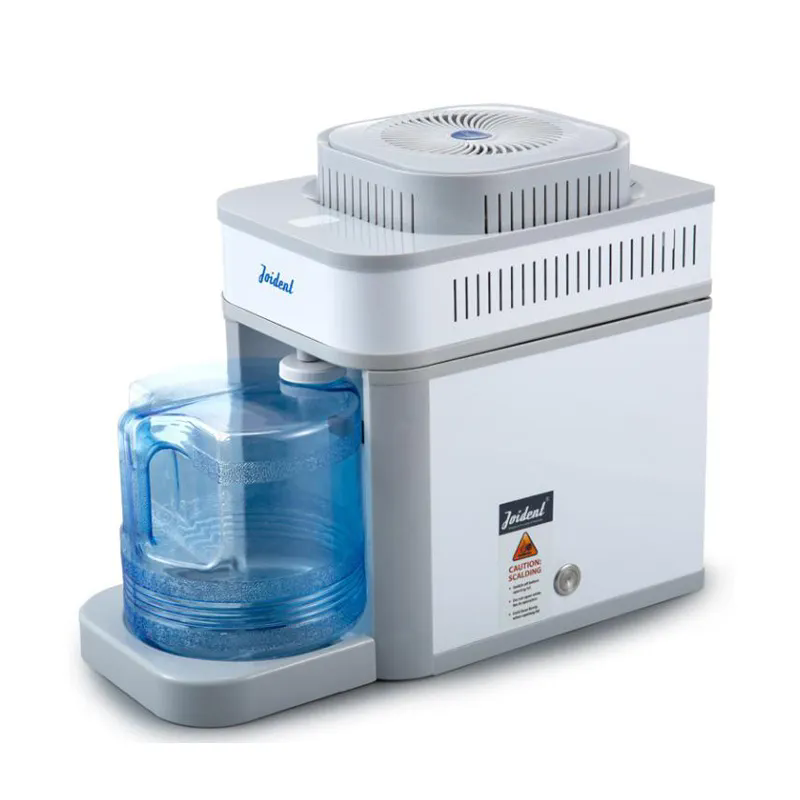The Importance of a Medical Clinic Water Distiller: Ensuring Purity and Safety
2024-08-14
In medical clinics, the quality of water used for various purposes is crucial for patient safety and the efficacy of medical procedures. Water distillers are specialized devices designed to purify water by removing contaminants, ensuring that the water used in clinical settings meets the highest standards of purity. This blog explores what a medical clinic water distiller is, its benefits, features, and considerations for choosing the right one.
What is a Medical Clinic Water Distiller?
A medical clinic water distiller is a device designed to purify water through the process of distillation. Distillation involves boiling water to produce steam, which is then condensed back into liquid form, leaving contaminants behind. This process effectively removes impurities such as minerals, bacteria, viruses, and other contaminants, providing high-purity water suitable for medical and clinical use.
Key Characteristics:
- Distillation Process: Uses heat to vaporize water and then condenses the steam back into liquid, leaving impurities in the boiling chamber.
- Purity Standards: Designed to meet strict purity standards required for medical and clinical applications.
- Capacity and Efficiency: Available in various sizes and capacities to meet the needs of different clinic sizes and water consumption levels.
Benefits of Using a Medical Clinic Water Distiller
1. High Purity: Distillation is one of the most effective methods for purifying water, removing contaminants that other filtration methods may miss. This ensures that the water used in medical procedures is free from harmful impurities.
2. Safety and Compliance: Ensures that water meets safety and compliance standards required for medical applications, reducing the risk of infection and complications associated with contaminated water.
3. Reliable Performance: Provides consistent and reliable purification, making it suitable for critical applications where water quality is paramount.
4. Versatility: Distilled water can be used for various purposes in a clinic, including cleaning medical instruments, preparing solutions, and for use in certain medical devices.
5. Reduced Need for Additional Filtration: Distillation effectively removes most contaminants, reducing the need for additional filtration systems or treatments.
6. Cost-Effective: While the initial investment in a water distiller may be higher, it can be cost-effective in the long run by providing a reliable source of purified water and reducing the need for purchasing bottled or pre-treated water.
Features to Consider
1. Capacity: Choose a distiller with the appropriate capacity to meet the water needs of the clinic. Smaller models may be suitable for smaller clinics, while larger units may be required for larger facilities.
2. Purity and Quality: Ensure that the distiller meets the purity and quality standards required for medical use. Look for certifications or specifications that indicate the distiller’s ability to remove specific contaminants.
3. Ease of Use: Consider features such as automated controls, easy-to-clean components, and user-friendly interfaces to simplify operation and maintenance.
4. Build Quality: Choose a distiller made from high-quality, durable materials to ensure long-lasting performance and resistance to corrosion or damage.
5. Maintenance Requirements: Look for a distiller with minimal maintenance requirements and easy access for cleaning and servicing.
6. Safety Features: Ensure the distiller includes safety features such as automatic shut-off, overheat protection, and secure locking mechanisms to prevent accidents and ensure safe operation.
Applications in a Medical Clinic
1. Instrument Sterilization: Distilled water is often used in autoclaves and sterilizers to ensure that medical instruments are cleaned without introducing contaminants.
2. Preparation of Solutions: Many medical solutions and preparations require pure water to avoid contamination and ensure efficacy.
3. Cleaning and Maintenance: Distilled water can be used to clean and maintain medical equipment, reducing the risk of mineral deposits and buildup that can affect performance.
4. Use in Medical Devices: Some medical devices and systems require distilled water for operation, and using purified water helps ensure their proper functioning.
Key Considerations
1. Regulatory Compliance: Ensure that the water distiller complies with local and international regulations and standards for medical and clinical use.
2. Installation and Space: Consider the space available for installing the distiller and any additional requirements for plumbing or electrical connections.
3. Cost and Budget: Evaluate the cost of the distiller, including initial purchase, installation, and ongoing maintenance, to ensure it fits within the clinic’s budget.
4. Long-Term Support: Choose a manufacturer or supplier that offers reliable customer support, including service and maintenance options.
Conclusion
A medical clinic water distiller is an essential tool for ensuring the purity and safety of water used in medical and clinical settings. By providing high-quality distilled water, these devices help maintain compliance with safety standards, enhance the effectiveness of medical procedures, and contribute to overall patient safety. When selecting a water distiller, consider factors such as capacity, purity, ease of use, and maintenance requirements to find the right solution for your clinic’s needs. Investing in a reliable and efficient water distiller ensures that your clinic has a consistent and safe supply of purified water, supporting the highest standards of medical care.



